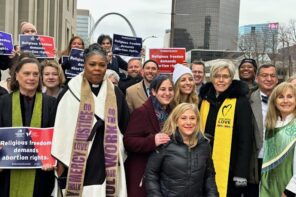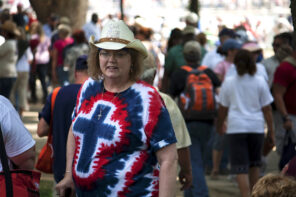The Pew Forum released a study late last week looking how religious beliefs influence perceptions on a number of different issues.
A quick-and-dirty look at the results would tell you that religion doesn’t change much, with a few notable exceptions. For example, this surprising statistic: “60% of those who oppose gay marriage say religion is the most important influence on their views.” One wonders where the other 40% comes from. Likewise, social issues come in dead last on a list of voter concerns. It’s not even close.
Even more startling, however, just 7% of respondents said that religion is the biggest influence in their thinking about immigration. And only 6% say the same thing about the environment. That’s despite the messages they’re getting from the pulpit: about 1-in-4 said they’d heard clergy talk about immigration, and nearly half said their religious leaders had spoken out on the environment.
As usual, though, the toplines obscure some important nuances. For example, while not everyone thinks faith is the most important factor on the subject of same-sex marriage, nearly everyone who does is against and Adam and Steve pledging their troth. An astounding 94% of those who rate religion highest oppose marriage equality.
You might think that reflects a dismal failure on the part of liberal clergy such as myself. After all, shouldn’t we be able to make the case that God wants everyone to be bound in covenant relationships?
Not so fast, Sparky. I think what this shows is that liberal believers bracket the question out of the religious realm.
That is, if you asked people in many UCC congregations if they thought faith was important in determining attitudes toward gays and lesbians, they might agree. But ask about same-sex marriage, and the answer you might receive would be “that’s a matter for civil jurisdiction, not the church.” The environment is almost a mirror image: only 22% of those who oppose tougher regulations cite religion as their most important reason. That says to me at least that their leaders have defined the environment out of the realm of faithful concern. Abortion follows the same pattern, almost. Eighty-two percent of those who say it should be illegal in all or most cases cite their faith. But just 26% say religion is most influential, despite nearly two-thirds of respondents saying that they’d heard their leaders speak on the subject. So apparently they’re getting the message—-and ignoring it.
Which brings us to the political implications. They’re pretty simple. First: multiply .18 by .26. That should give you (digging for iTouch calculator) 4%. That’s the number of people who can be persuaded on religious grounds to preserve reproductive rights. Common ground on this subject does not work. The best you can hope for is to change the subject, and we all know how well that worked during the health care reform debate. (Conversely, .82x.26=.21, or nearly all of the Republican base.)
Second: nobody gives a rat’s patootie about religious views on immigration or the environment, except religious leaders. Common ground built on uncontroversial issues does not work. Nobody cares about “creation care,” nobody cares about “the least of these” in the desert. Not many, anyway.
What does work? Not much, it would seem. At least not when it comes to the subjects Pew chose to poll. But go back and take a look at the list of voter priorities: 90% say the economy is a “very important” topic. 88% jobs, 78% health care. Get the hint? And that’s with a forced-choice list. If you asked respondents to come up with their own list, it might be even more lopsided. Preachers who want to know what’s on the mind of their congregations might want to think about that, as might anyone who wants to know what relevant word faith might have to speak to the world. As it turns out, God has rather a lot to say on the subject.




